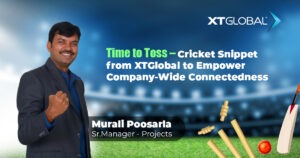What The Internet Of Things Means For IT Professionals
By XTGlobal Posted 10-Oct-2014
While it began with smartphones and PDAs, there’s now everything from smart watches to smart thermostats available on the market. The Internet and networks that were once limited to just PCs now allow anything that has valuable information to go online. This new trend has the potential to impact all aspects of the job IT professionals perform, but how? Perhaps the more important question is: How can IT professionals prepare for the Internet of Things?
Impacts Of The Internet Of Things
Techopedia defines the Internet of Things (IoT) as “a computing concept that describes a future where everyday physical objects will be connected to the Internet and be able to identify themselves to other devices.” Basically, it allows businesses to gather vast amounts of real-time data about the way consumers utilize their products. As more companies embrace the Internet of Things concept, it will fall to IT professionals to not only handle the analysis of Big Data, but also to help guide product developers on the most effective ways to utilize and harness the power of this new technology
A year-long study performed by Accenture found that “the United States is projected to create nearly 39,000 new jobs for analytics experts through 2015, but will only be able to fill 23 percent of those roles with qualified candidates.” While this skill gap represents a clear challenge to businesses as IoT gains traction in their industries, it represents massive opportunity for savvy IT professionals willing to obtain advanced analytic skills with a focus on how their chosen industry will utilize these mountains of data.
Many companies are already feeling the effects of this knowledge and skills gap within the existing IT workforce. Without IT professionals available to adequately manage the ever-increasing parameters of Big Data, some companies are unable to realize the early potential of the Internet of Things, forcing them to remain on the sidelines while the early adopters blaze new trails across a variety of industries.
Early adopter Royal Caribbean has tapped into the power of IoT to improve the efficiency of its staff, cut costs on wasted food and improve the overall experience to guests cruising on their Oasis class of ships. Henry Mayo Newhall Hospital, on the other hand, is using IoT to revolutionize the healthcare industry by giving doctors the patient data they need with a single tap of their badge on any device. This allows them to spend more time with their patients than they do logging into various systems to get the information necessary to provide effective treatment.
It’s More Than Computers
As an increasing number of businesses recognize the power of the Internet of Things, they’ll need IT professionals with expertise in more than just computers. With everything from watches to cars to heart monitors going online and creating Big Data, it’s more important than ever to expand your technological horizons.
Specialization will be the key to successfully navigating the coming demand. Rather than trying to learn as much as you can about everything IoT-related, consider narrowing your focus to only one or two product types that interest you. To maximize your earning potential, you may want to evaluate which industries have the potential to be the most lucrative and focus only on those technologies that will impact that specific industry.
Keeping Knowledge Current And Relevant
Once the Internet of Things reaches the radar of the average consumer, you can expect a glut of new information to be available in consumer publications, in addition to the IT news sources you already follow. Be open to these new sources of information because they may be able to provide you with news you’re unable to get elsewhere.
While it’s usually best in the world of IT to deal in fact rather than rumor, IoT changes will soon start coming faster than news writers and PR professionals can confirm that rumors are true. Having at least a general idea of what advances and developments are coming down the pipe can allow you to start positioning yourself to be an asset to the businesses that will be most impacted.
Unfortunately, your biggest competition will no longer be from other local IT professionals. Since Asian countries are already leading the world in IoT advancements and utilization, American companies may turn to overseas professionals to obtain the skills and knowledge they can’t find in the American IT workforce. Working to close the knowledge gap and becoming an expert in at least a few of the most in-demand IoT technologies can help you stay competitive.
But improving your hard skills is just one of the steps necessary for success in this changing technological landscape. As the Internet of Things allows for sweeping changes across industries, gone will be the days of getting years between new product releases. Instead, innovative IT professionals will be working hard to produce quarterly, if not more frequent, updates to all their products.
If you can embrace the new requirements for innovation, flexibility and expanding knowledge to stay one step ahead of the competition, you’ll have virtually unlimited opportunities in the coming years.
Understanding Security Implications
While many IT professionals already report that they support two devices per employee at their companies, the security implications of gathering data from hundreds or thousands of outside sources are incredible. Now, instead of a few employees trying to remotely access the server at any time, unsecured end user devices from outside the company will also require access. Even if your company has Internet of Things projects in the works, it’s unlikely the product managers have already thought through the full ramifications of that type of demand on current security protocols
Perhaps the greatest and most immediate opportunity for the savvy IT professional is in the area of data security. If you take the time to refresh your data and network security knowledge and skills, you could be in an excellent position for advancement as companies begin to realize the potential for a security breach. Security positions are already in high demand and the need for experienced data security professionals will only increase as more companies embrace the technological possibilities of the Internet of Things.
Staying Innovative And Adaptable
As the landscape of your profession continues to evolve in the face of this powerful new technological concept, your ability to take on new types of projects can set you apart from your less adaptable peers. While there are steps you can take now to help prepare yourself for potential new opportunities, you won’t be able to anticipate everything that’s coming your way. Keeping an open mind and a positive attitude will be critical as your employer begins adding IoT projects unlike anything you’ve ever worked on before.
The sheer volume of data that the Internet of Things allows you to collect will create a problem for business and a unique opportunity for you, if you’re willing to lead the way on IoT innovation. Not only will businesses be looking for people to help them understand what data to collect, but they’ll also need people like you that can help them unleash the full potential of that data. For example, the power of IoT allows the creation of heart monitors that can alert users when they’re at risk of a heart episode.
That’s an excellent and necessary technology, but let’s take it a step further. Using the data these heart monitors collect about patients, doctors will have the ability to make more informed treatment plans for their patients. Pharmaceutical companies that manufacture heart medications will also have powerful information about how the medication affects someone with a heart condition, as well as real-time data on any complications it may cause.
When you step back even further, you’ll see that the Internet of Things creates virtually unlimited possibilities across all industries, not just a select few. This will certainly lead to unprecedented opportunities for any IT professional willing to embrace the new technology and become an authority in it.
Baker, N. (2013, July 2). How IT Professionals Can Brace Themselves for the Internet of Things via @SwitchOnEaton’s The Plug. How IT Professionals Can Brace Themselves for the Internet of Things. Retrieved October 21, 2014, from
http://switchon.eaton.com/plug/article.aspx/how-it-professionals-can-brace-themselves-for
Hinks, J. (2014, June 4). Internet of Things: 86{767d28ad76a9332a942d27810214d6b17200cfdc480f57427b4595d0c42a08ef} of IT professionals express security and privacy concerns. ITProPortal. Retrieved October 21, 2014, from
http://www.itproportal.com/2014/06/04/internet-of-things-86-of-it-professionals-express-security-and-privacy-concerns/
Internet of Things: The Future of Business Technology | Microsoft. (n.d.). Internet of Things: The Future of Your Business Technology. Retrieved October 19, 2014, from
http://www.microsoft.com/windowsembedded/en-us/internet-of-things.aspx
Leung, S. (2014, August 6). What the Internet of Things Means for Your Business [Slideshare]. Blog. Retrieved October 21, 2014, from
http://blogs.salesforce.com/company/2014/08/internet-of-things-business.php
McKendrick, J. (2014, October 21). Internet of Things: which things really should phone home? | ZDNet. ZDNet. Retrieved October 21, 2014, from
http://www.zdnet.com/internet-of-things-which-things-really-should-phone-home-7000034893/
Paterson, A. (2014, August 21). The Internet of Things: what is it and what does it mean for you?. ICO Blog. Retrieved October 21, 2014, from
http://iconewsblog.wordpress.com/2014/08/21/the-internet-of-things-what-is-it-and-what-does-it-mean-for-you/
Violino, B. (2013, July 29). The ‘Internet of things’ will mean really, really big data. InfoWorld. Retrieved October 28, 2014, from
http://www.infoworld.com/article/2611319/computer-hardware/the–internet-of-things–will-mean-really–really-big-data.php
Vlack, M. V. (2014, February 20). What The ‘Internet of Things’ Means For Big Data Storage. Acronis Blog. Retrieved October 21, 2014, from
http://blog.acronis.com/posts/what-internet-things-means-big-data-storage
What is the Internet of Things (IoT)? – Definition from Techopedia. (n.d.). Techopedias. Retrieved October 21, 2014, from
http://www.techopedia.com/definition/28247/internet-of-things-iot
###
Other Blogs
-
 Read Blog >
Read Blog >09-Dec-2022
Time to Toss – Cricket Snippet from XTGlobal to Empower Company-Wide Connectedness
-
 Read Blog >
Read Blog >02-Dec-2022
Continued Success Amidst Covid with Business Continuity Plan – Know How XTGlobal Withstood Global Pandemic
-
 Read Blog >
Read Blog >11-Nov-2022
Learn to Stress On Without Stressing Out
-
 Read Blog >
Read Blog >04-Nov-2022
Is Hiring So Tiring Post Covid? Sharing My Thoughts on Reshaping It
-
 Read Blog >
Read Blog >14-Oct-2022
XTGlobal Seaside Office: A Perfect Workcation for the Post Pandemic Workforce
-
 Read Blog >
Read Blog >23-Sep-2022
Training the Youth of XTGlobal: A Fun-filled Skill-Based Technical Training


